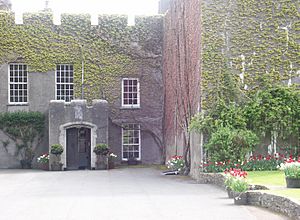Philip Jones of Fonmon facts for kids
Colonel Philip Jones (1618 – 5 September 1674) was a Welsh military leader and politician. He played an important role during the English Civil War. He served in the Parliamentary Army and later became a member of the English Parliament, helping to govern the country.
Contents
Early Life and Military Career
Philip Jones was born in Swansea, Wales, in 1618. His father was David Johns. During the English Civil War, Jones joined the Parliamentary Army. This army fought against King Charles I's Royalist forces.
Jones quickly rose through the ranks. He became a colonel in the Parliamentary Army by 1646. He was also made governor of Swansea in 1645. As governor, he successfully defended Swansea from the Royalist forces. By 1649, he was also the governor of Cardiff.
A Life in Politics
Philip Jones became a very active politician. In 1650, he was elected as a Member of Parliament (MP) for Breconshire. An MP is someone chosen to represent an area in the country's parliament. He served in Parliament until 1653.
He also became a member of the Council of State. This was a powerful group that helped to govern England during this time. Jones was later chosen to represent Monmouthshire in another Parliament.
In 1654, he was elected as an MP for both Monmouthshire and Glamorgan. He chose to represent Glamorgan. He was re-elected for Glamorgan in 1656.
Important Roles and Wealth
In 1654, Philip Jones bought Fonmon Castle and many other estates. This made him very wealthy. He also became a key figure in Oliver Cromwell's government. Cromwell was the leader of England after the King was defeated.
Jones became the comptroller of Cromwell's household. This meant he managed Cromwell's personal affairs and staff. He was also appointed a Privy Councillor. This was a special advisor to the ruler. In 1657, he became a member of Cromwell's Upper House, known as Philip Lord Jones.
He even helped organize the funeral of Oliver Cromwell in 1658. In 1659, he was in charge of the local army in Cardiff Castle.
After the Monarchy Returned
When the monarchy was restored in 1660, Charles II became King. Many Royalists wanted Jones to be put on trial. They were upset because they had lost their lands to him during the war.
Jones was brought to trial in 1661. He was accused of taking the organ from St. Mary's Church in Swansea. However, he was cleared of this charge. He continued to live peacefully.
He died at Fonmon Castle in 1674, at the age of 56. He was buried in Penmark Church. Philip Jones rose from a modest background to become very rich and powerful. This was quite an achievement for someone from his beginnings.
Family Life
Philip Jones married a daughter of William Price of Gellihir in 1642. They had a son named Oliver. His grandson, Robert, also became a Member of Parliament, continuing the family's political involvement.
 | Stephanie Wilson |
 | Charles Bolden |
 | Ronald McNair |
 | Frederick D. Gregory |


